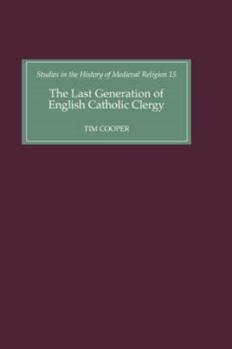The Last Generation of English Catholic Clergy: Parish Priests in the Diocese of Coventry and Lichfield in the Early Sixteenth Century
(Part of the Studies in the History of Medieval Religion Series)
Traces the careers and fortunes of the last priests ordained before the Reformation. A central paradox of the English reformation is that the call to the Catholic priesthood was never more eagerly answered than on the very eve of religious upheaval. In this important new study, based on the records of the third largest diocese in the country, covering six counties of the midlands and north-west, Dr Cooper traces the careers of the pastoral clergy from their preparatory education, through ordination and job-hunting, to the writing of theirwills, often in ripe old age and having served a single parish through the entirety of the main period of reform. In this highly clericalised' society, in which ten new priests were ordained each year for every arising vacancy, it was those priests without livings who were the main point of contact between the church and its people. This clerical proletariat', and, indeed, the majority of parochial incumbents, emerge as conscientious servants of their native communities, distinguishable from their neighbours by virtue of their sacramental function rather than their social backgrounds and general concerns. Throughout, the book argues that the parish clergy, whose services were ingreater demand than ever before, were remarkably well integrated into the communities they served and that popular anticlericalism as an explanatory factor of the English reformation is difficult to sustain.
Dr TIM COOPER has taught history at the universities of Sheffield, Manchester and Hull.
Dr TIM COOPER has taught history at the universities of Sheffield, Manchester and Hull.
Format:Hardcover
Language:English
ISBN:0851157521
ISBN13:9780851157528
Release Date:December 1999
Publisher:Boydell Press
Length:254 Pages
Weight:1.33 lbs.
Dimensions:1.0" x 6.4" x 9.6"
Customer Reviews
0 rating





